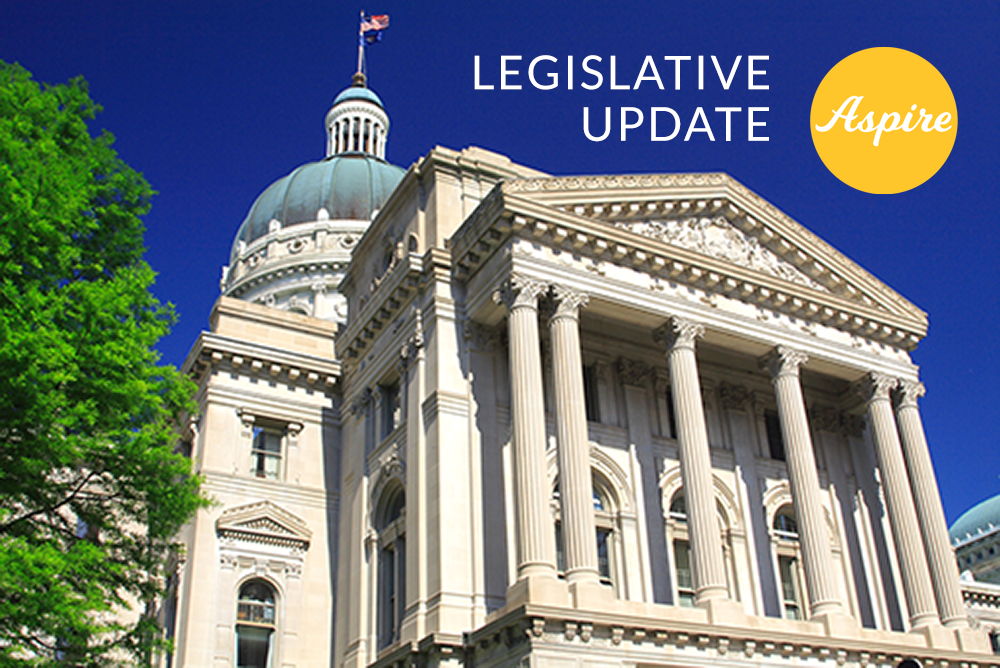Aspire Supports Childcare, Small Business at the Statehouse

The Indiana General Assembly returned to session earlier this month. This body pivots every other year from holding a three-month session to holding a shorter two-month session.
This year’s assembly is a short session, which also began a week later than usual and is expected to end a week earlier. This condensed calendar means lawmakers won’t have time to move much legislation, and the bills that move will do so quickly. Aspire Johnson County was prepared for this speed and has been busy.
As a reminder, our priorities this session are to support quality childcare expansion and workforce development. Here are highlights on our top priorities and more.
Childcare Expansion
Business and community groups strongly advocated last year for increased partnership from the State to help grow the availability and affordability of early learning in Indiana. Chambers of commerce were particularly effective, securing increased state funding and a new employer grant.
Legislators continued to explore the issue last summer and filed several bills this session to further tackle the issue – SB2, SB 147, SB 152, and HB 1102. Collectively, these bills seek to address early learning teacher shortages and program expenses by:
- establishing pilot “micro-facilities”
- lowering the minimum age of childcare workers
- giving childcare workers access to childcare credits for their own children (a significant perk to employment)
- limiting overly restrictive local zoning prohibiting in-home care
- extending childcare vouchers to the children of those receiving disability benefits from the Veterans Affairs Administration
- expanding tangible property tax exemptions for centers and onsite employer programs
Aspire testified or signed onto letters in support of these bills. We anticipate provisions which have a fiscal impact will get stripped because this is not a budget session, and the State is adjusting to major fiscal changes from 2023. The Republican caucus priority bill, SB2, primarily carries the recommendations from last year’s interim study committee of the Public Health Committee. We anticipate most of the language from the other childcare bills will merge into SB2 to create a single moving childcare bill.
We support these efforts because we hear from parents struggling to find adequate early learning opportunities for their family. Parents are forced to stay out of the workforce when they would otherwise be interested in working. We know lack of affordable and reliable childcare leads to worker tardiness, absenteeism, and turnover. Childcare is an important infrastructure system feeding our local and state economies.
When parents have improved access and affordability, it reduces their heavy financial stress and makes them more productive employees, boosting employer productivity and regional GDP. We will continue to support proposals to achieve this.
Workforce Development
Aspire kicked off the first half of session testifying in support of HB 1001 in the House Education Committee.
HB 1001 is the trailer legislation to HEA 1002 from last year which sought to “reinvent high school” and gave high school students access to state funding for Career Scholarship Accounts (CSAs) to be used for workforce training and career exploration (up to $5,000 per student for job training). This year’s HB 1001 would expand the use of these funds to obtain a driver’s license (so the student can get to an internship). Similarly, the legislation would also allow for other existing scholarships (e.g., Twenty-first Century Scholarship) targeted for attending college to also fund workforce training.
Some legislators had concerns regarding using funds targeted for post-secondary education and moving them towards workforce training, stating it could drive competition between programs that is unnecessary.
Aspire met with the bill author to ask him to consider two proposed amendments regarding the 30-minute career exploration meetings from last year’s HEA 1002: to increase or remove the cap of five students and to allow for a live virtual meeting option. We ask for these provisions to support growing regions with thousands of students, and, conversely, to ensure rural students gain access to a diverse set of employers with diverse career paths.
We then testified the same in the House Education Committee. The bill passed the committee, was reassigned to Ways and Means, and passed again. It passed the full House by a vote of 80-17 and now heads to the Senate without our requested amendments. We will continue to work on the bill in the Senate.
Small Business Start Up Support
In a strong show of support for small business, Aspire testified in support of HB 1165. This bill would encourage the state to award 5% of state contracts to Indiana-based businesses that have been in operation for fewer than five years. It also encourages the state to use 5% of state workforce development funding to support organizations or programs for individuals starting new businesses in Indiana. And it would eliminate the fees for filing articles of incorporation of a domestic business corporation. This policy is pro-small business.
We support this bill because the first five years of a business’s lifecycle are important growing years. These early-stage companies are often formed to meet new or underserved market demand but lack the marketing and brand capacity of later-stage companies. One small state contact has the potential to lift and spotlight a small business with big potential. Every large company began small.
We also like this bill because it creates a “regulatory sandbox program.” Companies can apply to this program to ask the state to waive or suspend certain regulations and/or fees to help boost speed to market, test a product, or be more viable / competitive in the product’s early start up stage.
We support this aspect of the bill because Indiana must have a wide range of economic development tools to capture and retain increasingly competitive company investment opportunities in Indiana. The regulatory sandbox program can also support existing Hoosier companies – keeping their innovation and development in Indiana. This policy is pro-jobs and investment.
After just three short weeks, this is the final week of committee work. Any bill not receiving a vote out of committee this week is dead and the language is not eligible for amendment into another bill. Surviving legislation must next pass through its originating chamber (House or Senate) and will then start the entire process over in the opposite chamber.
Aspire will continue to follow important legislation advancing economic and community development, and business success. We will work extra hard to keep advancing our positions on childcare and workforce development.
Please reach out to us if you have any questions on these or other bills.
